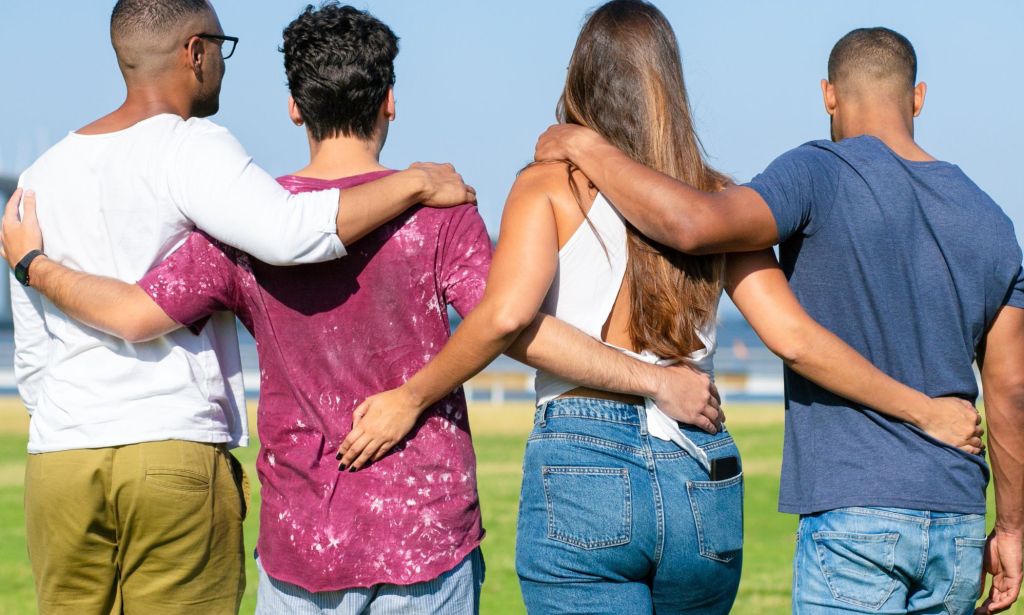 June 06 2025, 08:15
June 06 2025, 08:15 A number of people are practising a form of non-monogamy, known as relationship anarchy, without even realising it.
Research from the non-monogamous dating app Feeld, shared with PinkNews, revealed that on average one in every two of its users was practising relationship anarchy without even realising it.
The study commissioned by Feeld in partnership with sex educator and influencer Ruby Rare also showed that those practising relationship anarchy felt more honest and respectful with their partners.
Rare says the results of the study suggest that understanding different kinds of non-monogamy can help people experience a “stronger, more dependable support network”.
She goes on to say: “By learning more about the principles of [relationship anarchy], there is an opportunity to experience intimacy and meaningful connection through a wider exploratory lens.
“There are so many ways in which support systems can be built and nurtured. This perspective doesn’t just challenge loneliness, it transforms it into an opportunity to build more authentic, affirming and resilient relationships.”
Which begs the question:
What is relationship anarchy?
Relationship anarchy typically is a form of polyamory, the application of the philosophical, non-hierarchical beliefs of anarchism to relationships, non-monogamous or otherwise.
Those who practise it aim to deconstruct the normative rules of intimacy, even ones posed by other types of non-monogamy, favouring to forgo traditional ideas of relationships. Essentially, the only rule is that there are no set rules.
It differs from other forms of polyamory, such as “ethical non-monogamy” or “kitchen table polyamory”, which set rules for how non-monogamous relationships work.
For many, relationship anarchy is less a relationship type and more a philosophical belief that helps to guide the shape of a couple’s or polycule’s relationship. Rather than disregarding all rules entirely, it dictates that all relationships are different and shouldn’t be governed by outside influences such as societal standards.

Rare says most relationship anarchists will set boundaries that work for them, rather than using normative ideas of intimacy as a guideline. This helps to emphasise “community” and “mutual care,” above all else, she adds.
“[Relationship anarchists] regard all their personal relationships as equally important [and] unique, fulfilling different needs or desires in their life, and possessing similar or identical potential for emotional/physical/mental intimacy, love and satisfaction.”
While this unique approach to relationships is rooted in historical examples of non-monogamy, the term was coined in 2006 by feminist Andie Nordgren as part of a manifesto for the belief.
To Nordgren, relationship anarchy’s main goal is to “question the idea that love is a limited resource,” while criticising more traditional forms of intimacy for imposing redundant restrictions on people’s love lives.
“Don’t rank and compare people and relationships, cherish the individual and your connection to them,” Nordgren said. “One person in your life does not need to be named primary for the relationship to be real. Each relationship is independent, and a relationship between autonomous individuals.”
How to know if you’re a relationship anarchist
Much like anything relating to political or social philosophy, relationship anarchy can be difficult to fully define and even more tricky to put into practice.
Figures from Feeld’s and Ruby Rare’s survey showed that, out of more than 6,000 people from the US, UK, Australia and Spain, an average of one in every five realised he or she had been practising a form of relationship anarchy without knowing it
So, are you one of them? Well, the answer can vary greatly depending on your definition of the term.
Using Nordgren’s manifesto as a basis for what makes a relationship anarchist, the primary goal is to remove forms of entitlement in a relationship and focus on respect, mutual admiration, independence and self-determination.

“Your feelings for a person, or your history together, does not make you entitled to command and control a partner to comply with what is considered normal to do in a relationship,” Nordgren said. “Explore how you can engage without stepping over boundaries and personal beliefs.”
This is typically why relationship anarchists are non-monogamous: it enhances the freedom for their partners to be independent. If monogamy is simply a good fit for a couple, they can still be considered relationship anarchists.
The core question relationship anarchists should be asking, Nordgren insisted, was: “How do you wish to be treated by others?” The answers to that question will help to cultivate a relationship that works for everyone.
“What are your basic boundaries and expectations on all relationships? What kind of people would you like to spend your life with, and how would you like your relationships to work?” she continued. “Find your core set of values and use it for all relationships. Don’t make special rules and exceptions as a way to show people you love them ‘for real.'”
Nordgren emphasised in the manifesto that relationship anarchy is not perfect, and isn’t designed to be. It instead allowed couples and polycules to understand their own needs and desires so they can shape their relationships accordingly.
“Relationship anarchy is not about never committing to anything, it’s about designing your own commitments with the people around you, and freeing them from norms dictating that certain types of commitments are a requirement for love to be real, or that some commitments, like raising children or moving in together, have to be driven by certain kinds of feelings.”
Share your thoughts! Let us know in the comments below, and remember to keep the conversation respectful.
The post Are you practising relationship anarchy without even knowing it? appeared first on PinkNews | Latest lesbian, gay, bi and trans news | LGBTQ+ news.